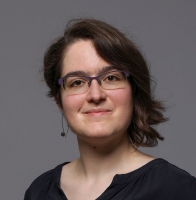Odjel za računarstvo
Hrvatska sekcija IEEE, Odjel za računarstvo Hrvatske sekcije IEEE i Znanstveni centar izvrsnosti za znanost o podatcima i kooperativne sustave pozivaju Vas na predavanje
"Digital Continuity: Securing the long-term value of digital data and technologies"
koje će održati Natasa Milic-Frayling sa Sveučilišta u Nottinghamu u četvrtak, 20. travnja 2017., u 15.00 sati, u Sivoj vijećnici na Fakultetu elektrotehnike i računarstva Sveučilišta u Zagrebu, Unska 3, Zagreb.
Predavanje je na engleskom jeziku, a predviđeno trajanje s raspravom je 60 minuta. Predavanje je otvoreno za sve zainteresirane, a posebno pozivamo studente.
Više o predavanju i o predavačici pročitajte u opširnijem sadržaju obavijesti.
Abstract:
Digital obsolescence is a systemic issue in the digital economy that causes constant disruption to organizations and individuals alike. As new software products or software versions are introduced into the market, the previous ones become outdated, unsupported and unusable. Yet, software is essential for consuming content and data. If a compatible software is not available, the digital assets are not usable any more.
Digital obsolescence affects everyone, businesses, non-commercial organizations, governments, and individuals alike. The inability to use previous versions of software prevents verification of analysis, simulations, and optimizations that have been done in the past. The lack of digital continuity is a fundamental issue of digital economy and must be addressed to avoid loss of value that we derive from digital technologies and content.
We discuss the fundamental properties of digital artefacts and their vulnerability to obsolescence. We offer an integrative framework for reasoning about (1) managing data and digital technologies to reduce the consequences of digital obsolescence and (2) technical approaches that are effective and economically feasible. We also discuss the UNESCO PERSIST initiative that plays an important role by raising the awareness of the problem and by aiming to establish an international bank of software that hosts and runs technologies required for the preservation of digital heritage.
Speaker biography:
Natasa Milic-Frayling is Professor and Chair of Data Science (DAS) Research Group at the School of Computer Science, University of Nottingham. She serves as a Chair of the Technology and Research Workgroup of the UNESCO PERSIST Programme and is a Founder of Intact Digital Ltd.
Natasa has a long track record in computer science research, focused on new paradigms in digital content management and analysis. Prior to joining the University of Nottingham in October 2015, she was a Principal Researcher at Microsoft Research (MSR) in Cambridge, UK since July 1998. During her tenure at MSR, she led the Integrated Systems research group and served as a Director of the Research Partnership Programme.
Through her work with the UNESCO PERSIST Programme and Intact Digital, Natasa addresses the key issues of digital obsolescence and works on economically sustainable models for digital continuity. Her ongoing collaboration with the digital preservation community dates back to 2006 when she led MSR participation in the PLANETS EU (2006-2010) followed by the SCAPE EU project (2011-2014).
Natasa is passionate about societal impacts of digital technologies. She promotes a dialogue between the ICT industry, consumers, and policy makers on strategic issues, including digital obsolescence and privacy respecting designs of computing systems and services. She serves as a member of the ACM Europe Council and the ACM Women Europe Executive Committee. She is on the Advisory Board for the Turing Gateway to Mathematics at the Isaac Newton Institute for Mathematical Sciences in Cambridge, UK.
Natasa has received her BSc degree in Mathematics from University of Zagreb (1984) and PhD in Applied Mathematics from Carnegie Mellon University, Pittsburgh (1989).
Forum
>> / Sve diskusijske grupe / Kurikulum za srednje tehničke škole
Napomena:
* - oznaka za nove poruke


